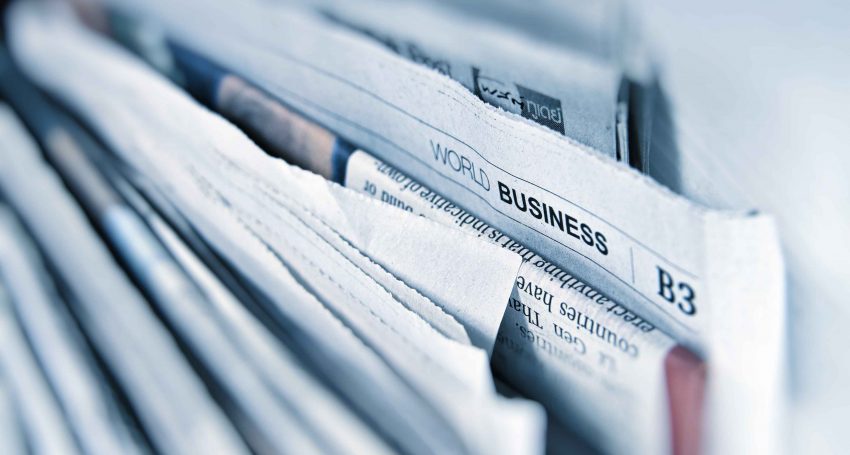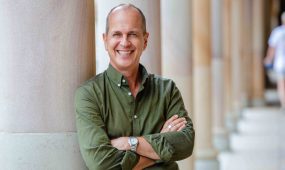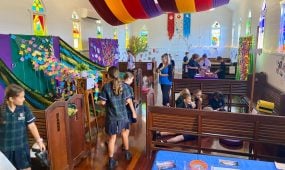World Press Freedom Day
Features
World Press Freedom Day is on 3 May, with this year’s theme based on the role of the media in elections and democracy: why do we even need this day and is a free and independent press still important?

“Democracy Dies in Darkness”
So says the slogan below the masthead of the legendary newspaper The Washington Post, the publication most noted for the 1970’s Watergate investigation, which brought down President Richard Nixon. It’s especially relevant and poignant in 2019 with the Post among the fiercest critics of autocratic President Donald Trump who defiantly has declared the media “the enemy of the people”.
Having spent around 25 years of my professional life as a working journalist up to 2007 (mainly for ABC TV-News and The Courier-Mail), I know and understand the drivers, factors and personal/professional pressures and biases involved in working for the Fourth Estate. For me, it was a wonderful, fascinating and rewarding career – a ‘front row seat to history’ in so many shapes and forms.
Having also spent a decade since then on the other side of the ledger as a media/corporate/PR/policy adviser, I feel I’m uniquely placed to make observations about the importance and relevance of a ‘free press’ in 2019.
Most people have a love-hate relationship with the media, or maybe it’s a case of “can’t live with them, can’t live without them.” We all rely on journalists and the media in some form to provide us with a steady diet of news, reportage, video and audio content and analysis – although increasingly there’s more junk food (sensationalism and trite/trivial content) in the daily diet than nutritious and wholesome information and coverage.
Working for the media can be a deadly exercise – with last year one of the worst on record around the world for deaths, with 94 journalists and media workers dying in targeted killings, bomb attacks and crossfire incidents. The most prominent of those was the assassination of Jamal Khashoggi (Saudi dissident, journalist for The Washington Post and former general manager and editor-in-chief of Al-Arab News Channel) on 2 October 2018 at the Saudi consulate in Istanbul, Turkey, which was perpetrated by agents of the Saudi Arabian government.
Advertisement
Once exposed – by other free and fearless journalists – the murder sparked world outrage and condemnation. While I aspired to be an ABC foreign correspondent – and almost got my dream job – I’m not sure that I was prepared to die for my profession as Khashoggi and others have done. Yet they do so in their commitment to highlighting the truth, exposing corruption and injustice and in many cases, preserving democracy.
Brisbane’s own free press champion, foreign correspondent and academic, Professor Peter Greste –who was jailed for 400 days in an Egyptian jail in 2015 on trumped-up charges – will be guest speaker at the annual Loaves and Fishes charity luncheon at St John’s Cathedral on 14 May. Since his release, he has become a vocal campaigner and advocate for media freedom and has launched the Alliance for Journalists’ Freedom, which promotes media freedom worldwide and the right of journalists to report the news in freedom and safety.
The challenging times for journalists and the media don’t just stop with those basic tenets. In a digitally disrupted commercial landscape where professionally trained working journalists are under siege as they compete with the purveyors of ‘fake news’ (with their own self-serving and usually devious agendas i.e “Russia, if you’re listening…”), citizen journalists and social media influencers. Coupled with the shrinking workforce in traditional newsrooms, this means it has never been tougher to be a member of the free press and to report without fear or favour.
Advertisement
But journalists would contend that their role and professional skills have never been more important and relevant with their ability to search for the truth, filter fact from fiction and present it an engaging and compelling manner.
In his new book Has the Luck Run Out? former editor-in-chief of The Courier-Mail, David Fagan opines that the most powerful media figures in Australia are Facebook, Google, YouTube and even Netflix, with the quality and influence of newspapers rapidly eroding to the point where most won’t be printed in 10 years.
“The worry is there are not many tears being shed about what this will do to the information that so heavily informs our democracy and way of life,” says Fagan. “News now has many homes on social media but without the assurance that someone has professionally checked it first.”
You can argue about the bias, veracity and fact-checking behind stories published in traditional media outlets, but as a working journalist I wouldn’t publish something without applying as much rigour and research as time allowed, to what I was being told or was being spun. While the same applies to a majority of journalists in 2019, an increasing element of the media adopt a “publish and be damned” attitude as major media outlets become more shrill and/or rely on click bait headline-grabbing in online sites to maintain engagement and to keep ‘eyeballs on screens’ to stay commercially viable.
Related Story
 News
News
Foreign correspondent a headline act at Loaves and Fishes Lunch
Over the years, a free, independent and fearless media has been transformational for society at different points in history – causing political and social upheaval, overturning autocrats (think ‘The Moonlight State’ investigation, which led to the Fitzgerald Inquiry and in turn the demise of Queensland Premier Joh Bjelke-Petersen) and dictators and triggering royal commissions and inquiries. A by-product has been the destabilisation and erosion of public faith in established institutions such as banks and churches.
It was the original expose by The Boston Globe’s ‘Spotlight’ investigative team (sensitively portrayed by the 2015 Oscar-winning movie of the same name) into sexual abuse by Catholic Church priests in Massachusetts which tipped the scales towards victims around the world.
While the four-years of the Royal Commission into Institutional Responses to Child Sexual Abuse in Australia was most traumatic and painful for survivors and their families, it was also cathartic and exposed significant failings by institutions, including the Anglican and Catholic Churches, to protect children in their care.
While there has been shame, shock and enormous damage to faith and spirituality in churches, it has – in the words of The Most Rev’d Dr Phillip Aspinall, Archbishop of Brisbane – “been a pilgrimage of justice, peace and healing.”
Journalists and those working in the media still serve an important function in the 21st century. Their ability to provide a level of scrutiny and accountability, especially to government and elected officials, most notably around free and fair elections, underpins the future of democracy while the filter they provide as a messenger of matters of public importance should always hold a place in Queensland and broader Australian society.
World Press Freedom Day is on Friday 3 May 2019.





